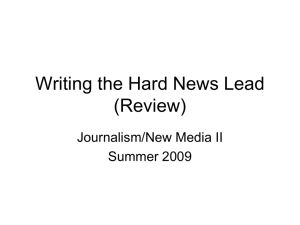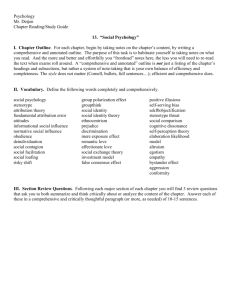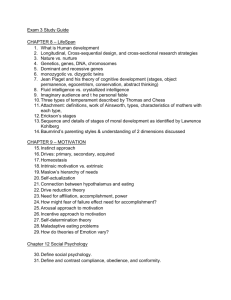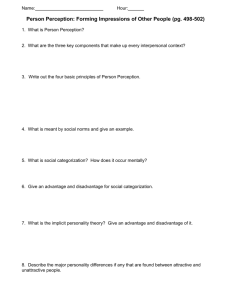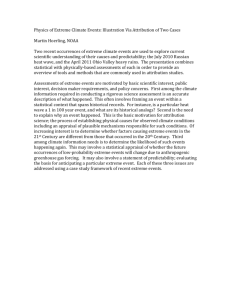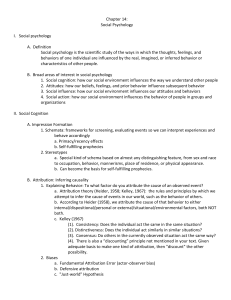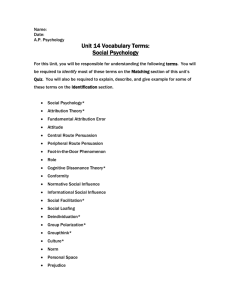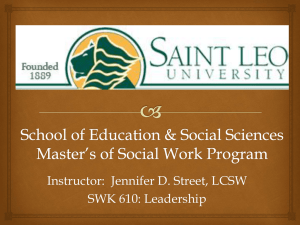Unit 12: Social Psychology
advertisement
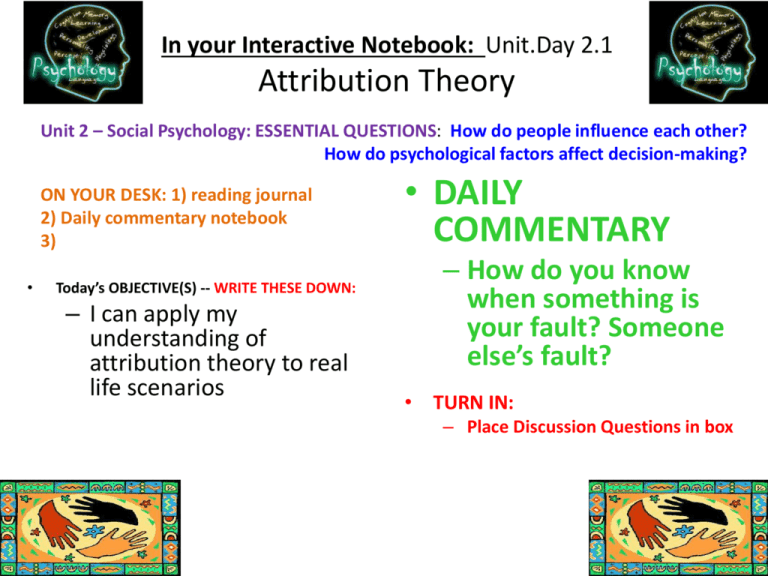
In your Interactive Notebook: Unit.Day 2.1 Attribution Theory Unit 2 – Social Psychology: ESSENTIAL QUESTIONS: How do people influence each other? How do psychological factors affect decision-making? ON YOUR DESK: 1) reading journal 2) Daily commentary notebook 3) • Today’s OBJECTIVE(S) -- WRITE THESE DOWN: – I can apply my understanding of attribution theory to real life scenarios • DAILY COMMENTARY – How do you know when something is your fault? Someone else’s fault? • TURN IN: – Place Discussion Questions in box Today’s Discussion Questions • Make sure your name is on the questions you submit, and that your question is unique. – This will be factored into your grade. DQ’S, Updates & Reminders • BIG PICTURE – Friday Quizzes • September 13 & September 20 – Projects Due • Reflection Paper: Why do good people do bad things? – Unit Exam: • Friday, September 27th • BEFORE YOU LEAVE: – Place Daily Commentary Notebooks on Center Table • Exams: I have them all. Tonight’s Homework: – RJ 2.2 • Griggs 289-303 • Myers 730-738 Unit 2: Social Psychology • ESSENTIAL QUESTIONS: – How do people influence each other – How do psychological factors influence individual decision-making • Minority Studies: – Unit 1: Isms, Group Identity, & a Theory of Oppression – Taught within the Social Psychology Unit – Will start next week Focuses in Social Psychology “We cannot live for ourselves alone.” Herman Melville Social psychology scientifically studies how we think about, influence, and relate to one another. 5 Social Thinking 1. Does his absenteeism signify illness, laziness, or a stressful work atmosphere? 2. Was the horror of 9/11 the work of crazed evil people or ordinary people corrupted by life events? Social thinking involves thinking about others, especially when they engage in doing things that are unexpected. 6 Attributing Behavior to Persons or to Situations http://www.stedwards.edu Attribution Theory: Fritz Heider (1958) suggested that we have a tendency to give causal explanations for someone’s behavior, often by crediting either the situation or the person’s disposition. Fritz Heider 7 Attributing Behavior to Persons or to Situations A teacher may wonder whether a child’s hostility reflects an aggressive personality (dispositional attribution) or is a reaction to stress or abuse (a situational attribution). http://www.bootsnall.org Dispositions are enduring personality traits. So, if Joe is a quiet, shy, and introverted child, he is likely to be like that in a number of situations. 8 Fundamental Attribution Error The tendency to overestimate the impact of personal disposition and underestimate the impact of the situations in analyzing the behaviors of other people leads to the fundamental attribution error. 9 Effects of Attribution How we explain someone’s behavior affects how we react to it. 10 Actions Can Affect Attitudes Why do actions affect attitudes? One explanation is that when our attitudes and actions are opposed, we experience tension. This is called cognitive dissonance. To relieve ourselves of this tension we bring our attitudes closer to our actions (Festinger, 1957). 11 Actor-observer bias • Basically another term to describe fundamental attribution error – We tend to ascribe our own behavior to situational factors and the behavior of others to character flaws Internal v. External Locus of Control • Internal Locus – Personal decisionmaking determines what happens in a person’s life • I am responsible for everything • EXTERNAL LOCUS – Situational factors determine everything • It’s not my fault Self-serving bias • We choose to remember and emphasize information about ourselves that makes us look/feel better than we are – Why did I ace the test? • I am awesome – Why did I fail the test? • The teacher did a bad job Just World Phenomenon • people have a strong desire or need to believe that the world is an orderly, predictable, and just place – Therefore, people tend to rationalize what they see in the world as being fair • The wealthy probably worked harder • The man who was murdered was probably into some bad stuff and had it coming Power of Individuals Non-violent fasts and appeals by Gandhi led to the independence of India from the British. Margaret Bourke-White/ Life Magazine. © 1946 Time Warner, Inc. The power of social influence is enormous, but so is the power of the individual. Gandhi 16 SKITS! • Work in groups of 5. • Each group will develop and perform a short skit that demonstrates the real life significance of one of the following: – – – – Fundamental Attribution Error (2 groups) Self-serving bias False Consensus effect Just World Phenomenon • 10 minutes to plan the skit – Maximum 3 minutes per skit Skit Rubric Students use planning time efficiently 5 Each student has a role in the skit Skit clearly and accurately conveys the concept 5 5 Performance is professional and each student can answer questions 5 DQ’S, Updates & Reminders • BIG PICTURE – Friday Quizzes • September 13 & September 20 – Projects Due • Reflection Paper: Why do good people do bad things? 1 page essay – Unit Exam: • Friday, September 27th • Tonight’s Homework: – RJ 2.2 • Griggs 289-303 • Myers 730-738
